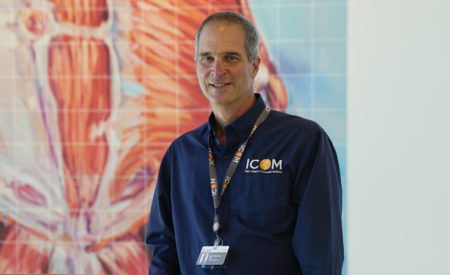 Dr. Gary Brandecker serves as Medical Director of Simulation and Assistant Professor of Emergency Medicine at the Idaho College of Osteopathic Medicine.
Dr. Gary Brandecker serves as Medical Director of Simulation and Assistant Professor of Emergency Medicine at the Idaho College of Osteopathic Medicine.
Dr. Brandecker attended Fairfield University in Connecticut before graduating from Georgetown School of Medicine in Washington, DC. He completed his residency in Emergency Medicine at Eastern Virginia School of Medicine in Norfolk, Virginia. Upon completion of his residency, Gary and his wife Karen decided to pull up their east coast roots and head to Wyoming, where they were drawn to the beauty and open spaces of the west. While in Wyoming, Dr. Brandecker was Medical Director of the Emergency Department for several years while also teaching EMT’s, as well as residents from the University of Wyoming’s Family Practice Program.
In 2001 Dr. Brandecker and his family, now with 3 children, relocated to the Boise area and joined Emergency Medicine of Idaho. He has continued to be involved in teaching medical students and residents from the University of Washington, as well as serving on several hospital committees.
Dr. Brandecker is board certified in Emergency Medicine and has over 25 years of clinical experience in the Emergency Department. He has always been interested and involved in teaching the next generation of physicians, and with the opening of Idaho College of Osteopathic Medicine, he has been given the opportunity to teach students at the start of their careers. When he is not working, Dr. Brandecker enjoys mountain biking, camping, working on classic cars and spending time with his family and their three dogs.
Q: What inspired you to pursue a career in medicine?
A: At an early age I was inspired by images that I saw on television. Obviously this was not a realistic view of medicine. I remember watching a show called “Quincy” which featured Jack Klugman as a forensic pathologist who would determine the cause of death and also identify the perpetrator. You can say that the current NCIS shows are a modern interpretation of the show. In high school I was drawn to science courses and always wanted to use the sciences in an active, hands-on process. I’ve always had an interest in how machinery functioned and would take things apart and put them back together again as a teenager. In college I really enjoyed anatomy and physiology, and thought medicine would be a great way to put all my interests together. Medicine was a perfect way to combine my science interests and “fix-it” attitude while working on the ultimate machine.
Q: How did you transition into academia, and what inspired you to work for ICOM?
A: In medicine you are teaching others at an early start. As a resident I was responsible for teaching medical students beginning in my second week of training and this continued throughout my residency. I enjoyed working with medical students and was recognized early on by my residency faculty for my interest in medical education. This interest continued with teaching of residents when I was an attending physician and I found myself in charge of resident education in the emergency department. The learning process never stops in medicine and watching the enthusiasm of students and residents makes my career more enjoyable and sustainable.
I always thought that it would be exciting to be part of a medical school. It was perfect when ICOM was opening in the same community where I’ve been living for the past 17 years. I joined the organization when the building was just a steel structure.
Q: What is your favorite memory from your time in medical school?
A: I don’t think there is one particular favorite memory. What I liked best about medical school was the camaraderie of my class as we navigated the challenging route that we were on. I enjoyed the classes and then entering third and fourth year clinical rotations and realizing by fourth year how far we had progressed. There are so many great memories that I can not pick out one.
Q: What is the best part of your job?
A: The best part of my job is working with small groups of students whether this is in mannequin-based simulation, task trainers, or clinical small group. I like the interaction and discussion that we have and watching students progress in their skills and decision-making.
Q: What advice do you have for ICOM’s student doctors as they prepare to become physicians?
A: During the course of your career you never stop learning. You will be constantly changing how you take care of patients or interact with patients. Be open to new ideas and learn from every interaction. As a student you will be observing many preceptors who will have slightly different approaches to patients. Watch these preceptors closely and pick up on the skills that you think seem to work best so that at the end of medical school you have a strong foundation to start residency.